- Category
- War in Ukraine
Russia Keeps Violating Maritime Law, Leaving a Toxic Oil Spill Trail
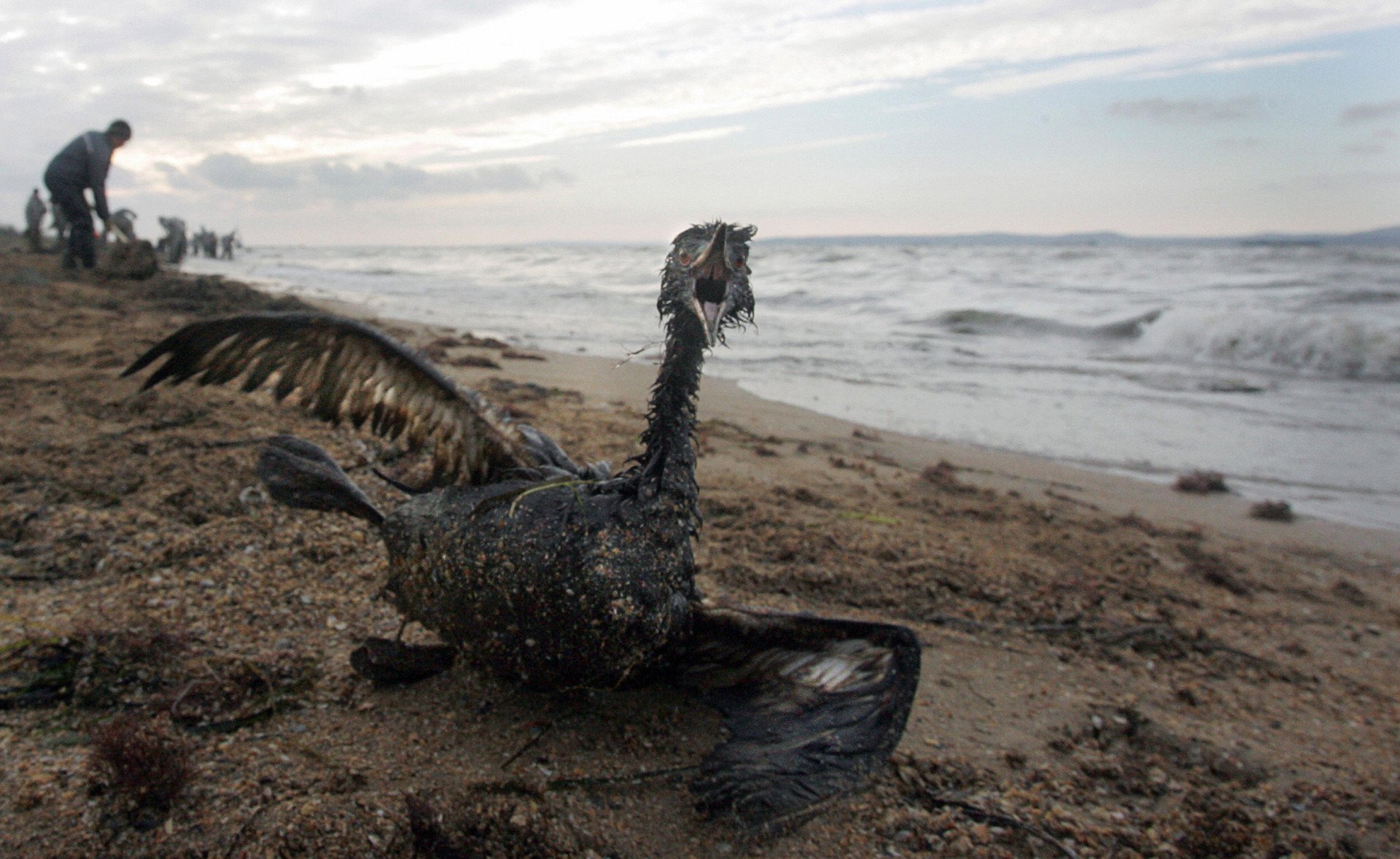
Russia not only attacks civilian populations and infrastructure but also wreaks havoc in the Black Sea. The recent Volgoneft tanker disaster is just the latest instance of Russia openly violating international maritime law through oil spills, committing marine ecocide, and exploiting Ukrainian resources by concealing their illicit activities.
A Russian oil tanker, Volgoneft-212, carrying approximately 4,300 tons of fuel oil and 13 crew members broke apart near the Kerch Strait after hitting a large wave. One crew member died and the remaining were hospitalized with hypothermia.
Another tanker, Volgoneft-239, that had been carrying 14 crew members, is sinking in the same area after running aground.
🔴 Greenpeace: An oil spill from two Russian tankers in the Black Sea, carrying up to 5,000 tons of oil each, threatens a new environmental disaster.
— UNITED24 Media (@United24media) December 15, 2024
💬 “This accident will be one of the largest man-made disasters in the Black Sea waters.” pic.twitter.com/HXB4vH7mDn
The two Russian tankers violated operating rules by going out to see during a storm – resulting in these accidents, said Dmytro Pletenchuk, the spokesman of the Naval Forces of the Ukrainian Armed Forces.
These vessels were not suitable for the sea as they were in fact, river vessels, Andriy Klymenko, head of the Institute for Black Sea Strategic Studies wrote on Facebook.
Plentenchuk highlighted that both oil tankers are more than 50 years old, "For them [Russia], transporting Russian oil or other fuel and lubricants is more important than adhering to the safety requirements of civilian navigation," he emphasized.
Anapa may have to forget about being called a "resort city" for a long time.
— WarTranslated (Dmitri) (@wartranslated) December 17, 2024
The storm is bringing more and more petroleum products to Anapa's beaches from tankers that sank in the Kerch Strait. The oil slick has already contaminated up to 35 km of coastline. Currently, the oil… pic.twitter.com/WUh5BNyieY
Russia’s aging tankers—an environmental catastrophe
Due to poor weather conditions, the spill will be extremely difficult to contain and clean up. Dr. Paul Johnston, Head of Greenpeace Research Laboratories stated that the oil spill could have a “significant environmental impact”.
A similar incident occurred in November 2007, when in the same area – the Kerch Strait, a storm struck and Russian ships spilled around 1300 tonnes of oil causing an environmental disaster, impacting both biodiversity and marine life.
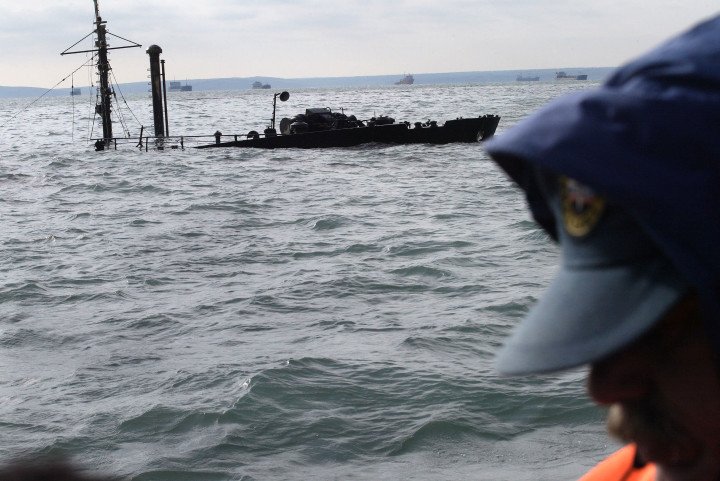
According to reports, large amounts of “heavy fuel oil mixed with algae covered the shore trapping and killing thousands of birds.” Hundreds of emergency workers, volunteers, and international organizations took part in clean-up operations, but regardless of the effort, the incident was considered an ecological catastrophe. The total area that was contaminated was estimated at about 700 km2 around 183 km of that was contaminated shoreline.
Natalia Gozak, director of the Ukrainian office of Greenpeace told Sky News that similar to the spill in 2007, “impact is expected for years to come.” Even one year after the 2007 spill, “the levels of pollution stayed really high, with traces observed years and years later” she added, “I think a new environmental catastrophe is on its way. The true impact will soon become apparent."
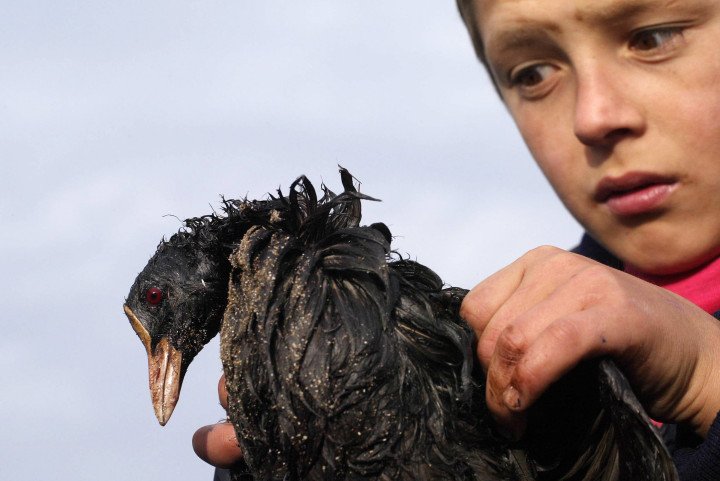
Green Peace stated that they call on Russian authorities to “take all efforts to mitigate or reduce the environmental impact of the oil spill, and withdraw the navy ships, and stop militarization of the region, returning Crimea under the rightful control of Ukraine.”
Russia spoofing their shadow fleet
This is not the first time Russia has violated shipping rules, specifically disabling the identification systems and ignoring coastal warning requirements, stated Dmytro Plentenchuk. The Kerch Strait has been closed to civilian shipping for more than a year, but they continue to violate these rules.
The Marine Traffic location system or automatic identification systems (AIS) for the Volgoneft-212 and 239 had been switched off for 12 days, Green Peace reported.
Turning of AIS is known as “spoofing” – showing incorrect locations of vessels, often to conceal the origins of its cargo.
The term 'shadow fleet' was primarily used to describe tankers 'going dark' by turning off their tracking transponders to conceal their true location and the destination of oil subject to US sanctions.
The EU remains a buyer of Russian oil and gas facilitated by a shadow fleet and sanction-evading schemes, including ship-to-ship oil transfers at sea, Russian oil continues to find its way to European markets.
Oil and gas account for one-third of Russia’s national budget and nearly 6% of GDP in 2024, equating to $140–$170 billion.
Strengthening sanctions is a critical strategy for weakening Russia’s ability to continue its war in Ukraine.
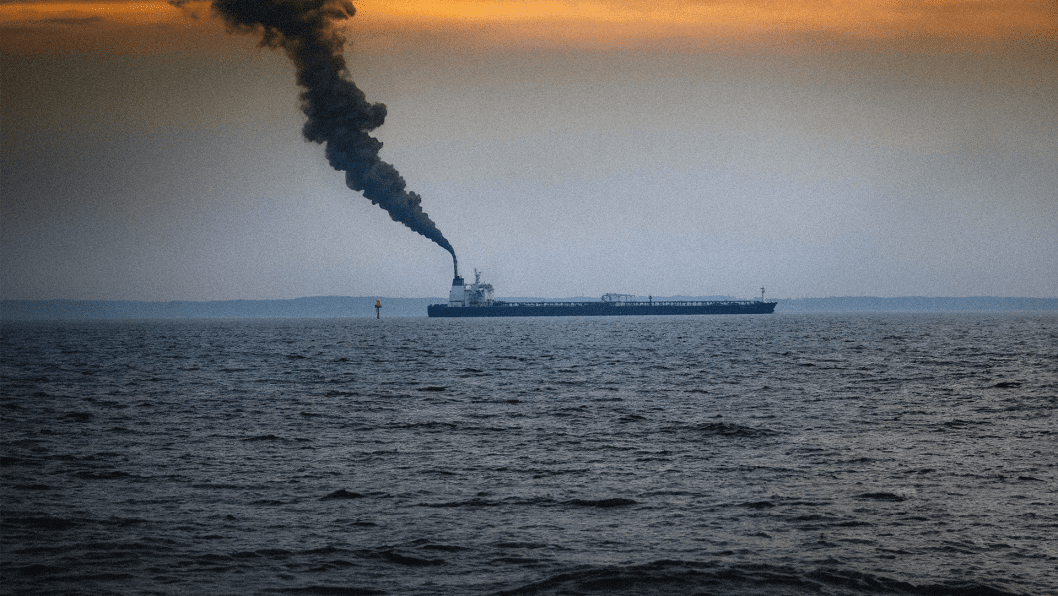
Ukraine Solidarity Project (USP) and Campaign for Ukraine, in November 2024 called for the UK government to further sanction Russia’s Shadow Fleet to prevent oil spills in European waters. USP along with Greenpeace Denmark filmed an oil tanker in Denmark passing just 2km from Copenhagens coastline.
A total of 79 oil tankers have been barred from European waters specifically due to the environmental risks that they pose, restricting goods “contributing to Russia’s war machine”, along with restricting illicit fuel sales.
This Russian oil tanker that we caught in Denmark—going a mere 2km from the coast of Copenhagen—is funding Russia’s war on Ukraine.
— 🇺🇦 Валерія Voshchevska (@Val_Voshchevska) December 16, 2024
The problem is, it’s one of many. pic.twitter.com/bNbLX6SlXy
Russia has used spoofing to hide the number of vessels entering the Black Sea or to conceal those involved in the export of Ukrainian goods. Since the full-scale invasion, there have been an alleged decrease in vessels using the Kerch strait.
Klymenko refuted this claim and stated that ship traffic is still very much active, "GPS spoofing, which distorts the position of ships, is actively used there. It is easy for experts to see that, for example, a large group of ships passing through the Kerch Strait are displayed in maritime systems as being located right at ... the Sheremetyevo airport in Moscow."
Russia has been using spoofing techniques since the illegal annexation and occupation of the Crimean peninsula. Researchers claim that Russian forces are the pioneers of military spoofing tactices, between 2016-2018 over 9000 spoofing incidents were recorded in Russian waters.
On average, 164 Russian trade cargo-carrying vessels per day spoofed their vessels in August 2024, according to Lloyd’s List Intelligence data, amounting to more than 1,000 vessels throughout the month.
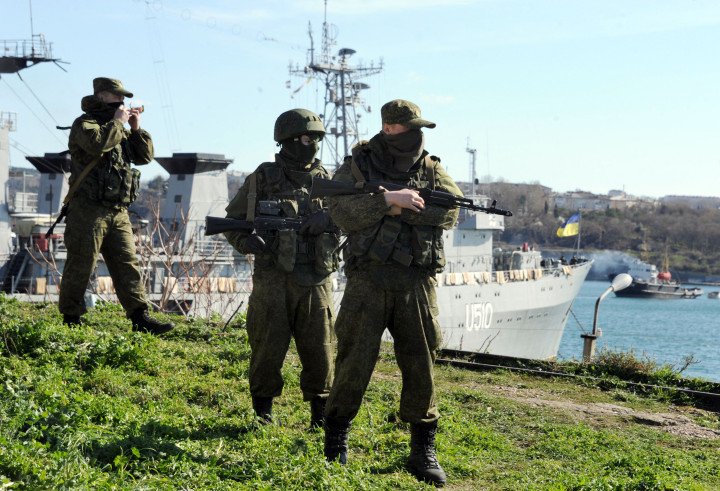
Spoofing has been detected for about 10 tankers visiting Russian ports around St Petersburg, Finlands Coast Guard said in November 2024. “Based on our assessment, this is related to the evasion of sanctions or their consequences,” Coast Guard commander Pekka Niittyla said.
“If a country buying Russian oil does not want to see that the oil was purchased from Russia, the seller or vessel might use spoofing to make it seem like the vessel had not visited Russia” Niittyla added.
Lloyds List noted that spoofing makes illegal activity hard to prove, effectively protecting it and allowing it to continue, “there is no way to draw a conclusion of potentially deceptive behaviour without further corroborating information, which may be hard to come by. It could mean voyages that are legitimately illicit or suspicious being written off as false positives.”
Construction of the Kerch Bridge committing marine ecocide
Russia has illegally annexed and occupied Crimea since 2014 and began the construction of the Kerch Bridge in 2016. Russia’s so-called “project of the century”, the construction of the Crimean Kerch Bridge was one of the most dangerous for the marine environment.
Russia began the construction without delay “whatever the environmental costs,” ultimately violating its obligation to preserve and protect the marine ecosystem within the Black Sea, Sea of Azov, and Kerch Strait (the “Black Sea Basin”) under UNCLOS articles.
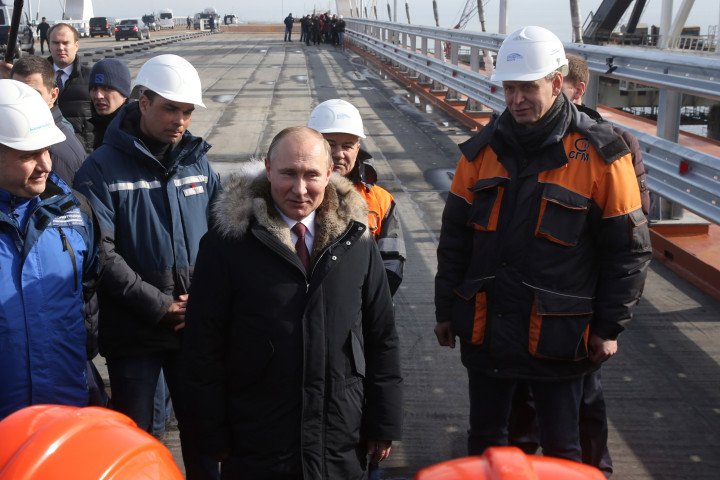
The Permanent Court of Arbitration (PCA) in the Hague 2023 highlighted that construction of the bridge would have had a huge environmental impact on marine life.
The Sea of Azov is home to two rare species of dolphin, registered in the Red Book of Ukraine and protected by the Agreement on the Conservation of Cetaceans of the Black Sea, Mediterranean Sea.
Acoustic pollution caused by construction can lead to anxiety and disturbance of animal behavior, noise from passing traffic over the bridge would also have an impact on animal migration. Though specific figures are hard to determine due to the occupation of Crimea, experts claim that since construction, dolphin deaths increased significantly in the area.
The PCA found that Russia had “failed to mitigate environmental risks relating to the Kerch Bridge construction projects.”
The PCA stated that “Russia’s own evidence shows that Russia anticipated the very environmental impacts that have identified: increased rates of surface and particulate disturbance; impacts on marine life of the construction-induced light, noise, and vibrations; a heightened risk of water pollution; potential impacts on the hydrodynamics of the Kerch Strait; and the ongoing risk of failure of the Bridge. Against this background, Russia’s current attempts to downplay the impacts associated with the Construction Projects lack credibility.”
The russians covered the strait between Dzharylhach Island and the mainland of the #Kherson region with sand.
— Viktoriia 🌻 (@home_fella) May 19, 2023
They turned a protected region in the occupied part of #Ukraine into a military training ground. This strait served as the main migration route for dolphins🐬 pic.twitter.com/tfQbTuvDSm
Russia’s illegal seizure of Ukrainian naval vessels
In November 2018, Russian security services rammed and fired on Ukrainian vessels, seizing the ships and arresting the sailors on board. Experts confirm that Russia violated the UNCLOS.
Ukraine said that three of its ships were traveling from Odesa to Mariupol and that 6 of their sailors were wounded, Russia claimed it only to be three. All 24 of the Ukrainian sailors were taken by Russian forces and placed in detention. At the time it was reported as the most “dangerous clash since Russia annexed Crimea in 2014.”
“A state cannot seize a foreign warship in any circumstances, but it can expel it from its territorial waters,” Julian Ku, an international law professor at Hofstra University told Defense Express, a Ukrainian media company specializing in military technologies and defense industry analysis.
Служба безпеки України затримали у порту Ізмаїл російський танкер "NEYMA", який блокував українські військові кораблі у Керченській протоці https://t.co/nN287hXnQg pic.twitter.com/BD3XVD1Hba
— СБ України (@ServiceSsu) July 25, 2019
In May 2019, the Hamburg-based International Tribunal for the Law of the Sea (ITLOS) ordered Russia to release and repatriate to Ukraine all 24 sailors. Russia had charged the sailors with “aggravated illegal crossing of Russia’s maritime state border” although no country but Russia recognized the peninsula as belonging to Russia.
The Kerch strait was a shared waterway between Russia and Ukraine, though Russia declared the waterway as theirs since their occupation of Crimea.
During a hearing at an international court, in September 2024, Ukraine accused Russia of attempting to “illegally seize control of the strategically important Sea of Azov and Kerch Strait.”
Russia weaponizing stolen grain
“Russia has cynically attempted to prevent Ukraine from exporting its grain, prioritizing its own aims above global food security,” a UK delegation announced in July 2024.
Before Russia’s full-scale invasion, Ukraine accounted for around 10% of global wheat exports and 12% of corn and barley exports. Agriculture is central to the Ukrainian economy providing 14% of jobs in Ukraine and 40% of their export income.
In July 2022, Russia, Ukraine and Turkey signed the “Black Sea Grain Agreement.” Before the full-scale invasion, 98% of grain exports flowed through the Black Sea ports.
The "Initiative on the Safe Transportation of Grain and Foodstuffs from Ukrainian ports” was seen as an instrumental move in addressing fears of food shortages worldwide.
Two years ago today, Ukraine signed a grain agreement with Russia. The deal was supposed to ensure the safety of commercial shipping in the Black Sea. But Russia broke it. pic.twitter.com/zFz5zUCTts
— UNITED24 Media (@United24media) July 22, 2024
A year later, in July 2023, Russia refused to sign an extension of the deal. Experts claim that Russia used their exit to weaponize grain, as during the second half of 2023, Russia’s grain exports reached a record high.
In 2023 the “4 million tones of grain stolen from occupied territories allowed the Kremlin to set world records for wheat sales in global markets,” reported the Ukrainian World Congress in January 2024.
Molfar investigated and found a company called ‘Crimean Sea Ports’ which is engaged in the sale of stolen Ukrainian grain. According to their report, grain is exported from the temporarily occupied territories of Ukraine to Crimea, and then transported to the Kerch port to be sold to foreign companies.
Kateryna Yaresko, a journalist with the SeaKrime project, which has been tracking illegal shipping activity around Crimea since 2016, found that “Sevastopol, in particular the Avlita grain terminal, and Kerch” are the main ports for shipping stolen Ukrainian grain.
In October 2024, SeaKrime found that a vessel named Princess Eva, loaded with stolen wheat from occupied Ukrainian territories left the the port of Sevastopol, Crimea, and traveled to Egypt.
SeaKrime claims that the company acts on behalf of another company in Oman and is owned by a Russian businessman Vladimir Palikhata, president of the Moscow Chess Federation. SeaKrime said that Palikhata is still not under sanctions and has British citizenship.
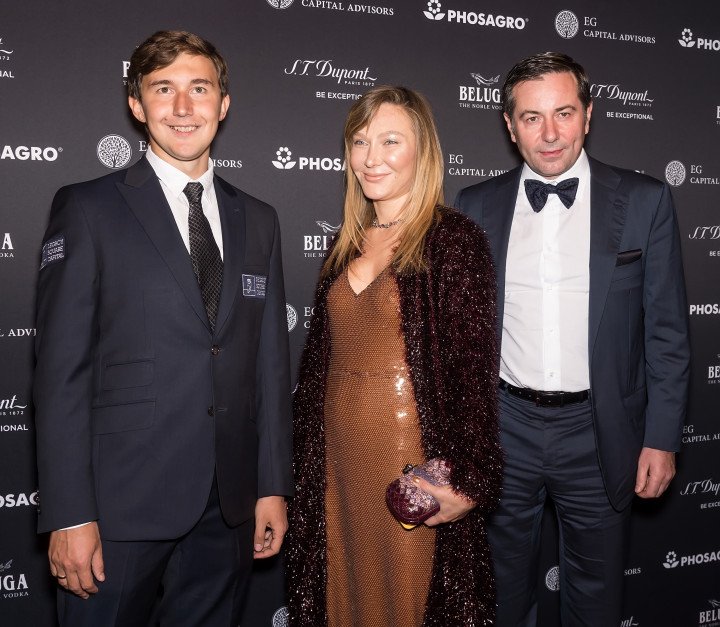
-46f6afa2f66d31ff3df8ea1a8f5524ec.jpg)
-35249c104385ca158fb62273fbd31476.jpg)


-554f0711f15a880af68b2550a739eee4.jpg)


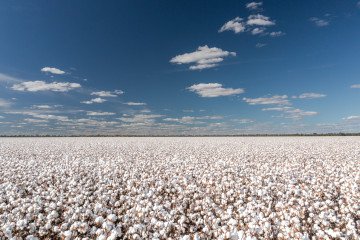
-206008aed5f329e86c52788e3e423f23.jpg)